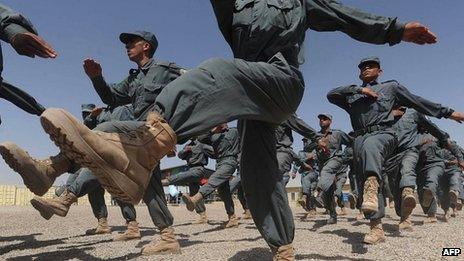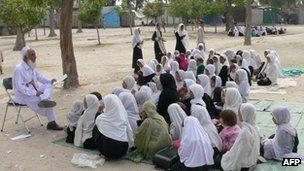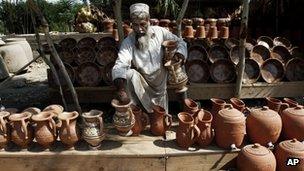Afghanistan's best and worst case scenarios
- Published

The security forces are only expected to control main towns and cities after 2014
BBC World Affairs Editor John Simpson in Kabul says there is not much optimism nowadays among Afghan politicians, diplomats and soldiers.
In a country which has known nothing but war for 40 years, the assumption is that it will just continue.
The most serious danger is that a political vacuum will build up.
There are considerable anxieties about this among Western governments.
The latest figure to check out the political health of the Karzai administration is UK Defence Secretary Philip Hammond.
He arrived at a moment when the Afghan government was anxious that protests would erupt here about the anti-Islamic film which has been made in the United States, as they have in Egypt, Libya and Yemen.
Mr Hammond's anxieties were different.
He was worried about the recent numbers of attacks by Afghans on Western soldiers who are teaching or mentoring them: the so-called "green-on-blue" incidents.
These would, he told President Hamid Karzai, endanger the entire British and American strategy for withdrawal from Afghanistan.
As a result, Mr Karzai issued new guidelines to his forces, designed to prevent this kind of thing: some practical, such as examining the backgrounds of new Afghan recruits more carefully, and some cultural, explaining Western attitudes a little better.
But Mr Hammond must also have wanted to find out whether President Karzai is becoming a spent force.
He has recently sacked some of his top ministers, but is finding it hard to get the Afghan parliament to approve new ones.
Elections wrecked
And the year 2014, when most Americans and British troops will pull out, is getting closer.

With luck, Afghanistan will become better-run every year
Afghanistan will hold a new presidential election that summer, two years from now. President Karzai will have to stand down, yet no-one has any idea yet who might take over from him.
So what is likely to happen?
The gloomiest scenario runs as follows: President Karzai will smooth the way for his brother, who has been accused of gross corruption, to stand for the presidency.
Many people here feel this would discredit the entire election process. Foreign countries would be reluctant to give Afghanistan the aid they have promised.
The Taliban, the scenario continues, will raise their campaign to new heights, and wreck the elections altogether.
The political system will then implode. The British and American troops will withdraw, and Afghanistan will be once more what the outside world allowed it to become in the 1990s: a black hole, in which only the most extreme elements could thrive.
This is scary stuff, and quite a few people here believe it. But when you examine it more closely, it does not really stand up.
For a start, people close to President Karzai seriously doubt that he will encourage his brother to stand in his place; in fact, they say, he will warn him off.
Hamid Karzai himself apparently wants to become an elder statesman after leaving office - someone above the fray, who can bring the warring factions together in peace.
Those hopes would be wrecked if his questionable brother were in power.
As for the Taliban, the Afghan experts say, they are not a united force in any way. They fall into three broad groups:
Those who enjoyed being in power, as they were from 1996 to 2001, and want to get back into government again
Those who joined the Taliban to get rid of Western troops
Those who want to keep on fighting, because it gives them a purpose in life
Muddle along
Top government people in Kabul maintain they can do a deal with the first two of these groups.

Afghanistan is not going to become another Switzerland
Jobs in government will be made available to the Taliban, and most Western troops are going anyway.
The only group they cannot come to terms with is those who are determined to keep on fighting.
The Taliban are clever and daring, but they do not seem to have the capability to take over the country again.
A much more likely outcome after 2014 is that the new Afghan government, like the present one, will control only the main cities and the air routes.
The rest of the country will be dangerous, and largely in the hands of Taliban groups or warlords.
So Afghanistan is not going to turn into Switzerland.
But if the outside world keeps its promises about financial help and does not forget about the country again, it could maybe muddle along.
Even civil wars peter out in the end.
With luck, Afghanistan will get a little richer, a little safer and a little better-run every year; until one day Afghans will wake up and realise that the decades of civil war are just a nasty memory.
You could scarcely win an election on a manifesto like that. But it is probably the best outcome Afghanistan can hope for.